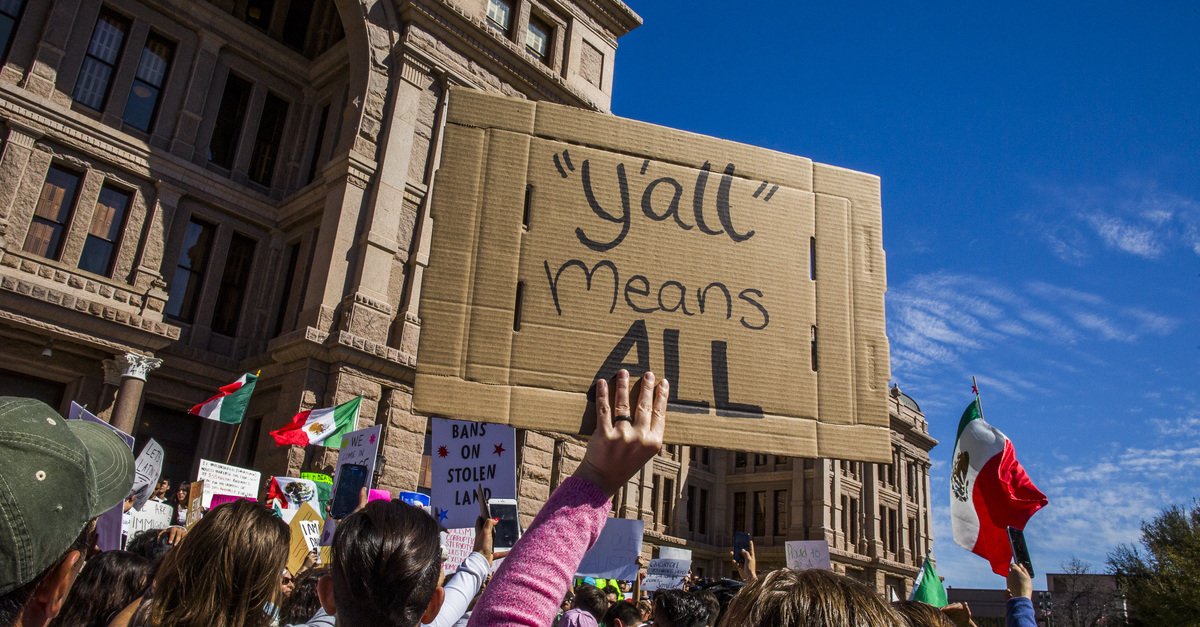
Texas unconstitutionally discriminated against nearly 100,000 people by supplying local authorities with a list that claimed their voter registrations might be illegal, according to a lawsuit filed in federal court by non-partisan government accountability watchdogs.
On Friday, the Campaign Legal Center (CLC) and the League of United Latin American Citizens (LULAC) filed a 21-page lawsuit in the U.S. District Court for the Western District of Texas alleging that Texas Secretary of State David Whitley and Texas Attorney General Ken Paxton violated both the Constitution and the Voting Rights Act by issuing an inaccurate advisory based on outdated information.
The complaint alleges that Whitley and Paxton unlawfully targeted 95,000 recently-naturalized Texans who had previously indicated they were not citizens but who are currently registered to vote. The problem, according to LULAC and CLC, is that those prior non-citizen declarations were made at the time the people included on the list applied for their first driver’s licenses in the Lone Star State. Since then, however, many of those same people have become citizens and therefore eligible voters.
A Friday evening press release issued by CLC explains the extent to which the list is believed to be inaccurate.
“[B]etween 50,000 and 65,000 Texas residents become naturalized citizens each year,” that release says. “Over the most recent six years of data – the lifespan of a Texas driver license – 348,552 Texas residents have become newly naturalized citizens. In compiling the list, Whitley relied on records that in some case are as outdated as 23-years old.”
“Texas’s new voter purge program for newly naturalized citizens is discriminatory and an unconstitutional burden on the right to vote,” the press release continues, “violating the 1st and 14th Amendments.”
The filing notes:
Newly naturalized citizens have the same right to vote as all other citizens, and states may not impose undue burdens on that right or target those citizens for suspicion, intimidation, threats, or coercion. But Defendants Whitley and Paxton have done just that, devising, implementing, and loudly trumpeting a voter purge program that is guaranteed to discriminatorily target newly naturalized citizens and inaccurately label them “noncitizens” based upon stale data, which Defendants admit constitutes “WEAK” evidence. Despite that admission, Defendants Whitley and Paxton have publicly threatened criminal prosecutions…
Whitley’s advisory also counsels local elections divisions to send each registered voter on the list a notice which demands proof of citizenship within 30 days or risk their voter registration being canceled. Controversially, such a cancellation can occur in one of two ways.
“The Advisory instructs registrars that they could use these matches to send the registered voter a Proof of Citizenship Letter…and cancel the voter’s registration if: (1) the individual did not provide proof of citizenship (in the form of a certified copy of a birth certificate, passport, or naturalization certificate) within 30 days from when the [notice] was sent; or (2) the [notice] was returned as undeliverable without forwarding information,” the lawsuit reads.
The publication of the list at first made waves. Since it was released, however, authorities in Texas have backtracked from their initial claims by admitting that a “significant” number of names were incorrectly included, according to the Texas Tribune.
Even some Republicans have criticized the list.
“I think they need to rescind it, do due diligence and make a more accurate list,” former Texas secretary of state Carlos Cascos told Texas Monthly. “They contact everyone and admit to it and say, ‘We made an honest mistake,’ and recompile the list.”
CLC and LULAC, on the other hand, sense that something more nefarious is likely happening in the Lone Star State.
“This is a system designed to remove as many registered individuals as possible, not to simply ensure that the potential stray noncitizen voter on the list is not permitted to vote,” the filing says. “Providing a single notice with a short 30-day time limit for a response with proof of citizenship is exceedingly strict and unlikely to result in a significant response rate from the many eligible voters on this list.”
[image via Drew Anthony Smith/Getty Images]